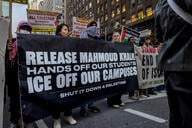You have /5 articles left.
Sign up for a free account or log in.
Students at Wesleyan University are urging the student government there to defund the campus newspaper, The Wesleyan Argus, after it published an opinion essay written by a writer for the newspaper criticizing the Black Lives Matter movement. Calling the effort a boycott, the organizers also encouraged students to toss out copies of the newspaper that they find on campus.
About 170 people have signed a petition supporting the boycott. Most of those signing were students, but the petition also included a handful of alumni and staff members. As of Tuesday, no faculty members appeared to have signed the petition, despite earlier reports saying otherwise.
"The undersigned agree to boycott the Argus, recognizing that the paper has historically failed to be an inclusive representation of the voices of the student body," the petition states. "Most specifically, it neglects to provide a safe space for the voices of students of color and we are doubtful that it will in the future."
The boycott, the petition states, would last until the Argus met a number of demands, including creating staff positions that pay students work study or award course credit. Currently, the Argus has enough funding for just two paid positions, and neither are part of the editorial staff. Its reporters and editors are all volunteers.
The petition also demanded that the newspaper release a monthly report on allocation of funds and its leadership structure, require social justice and diversity training each semester, and devote "open spaces dedicated to marginalized groups/voices" on the front page of the newspaper. If no submissions are received for a particular edition's open space, the newspaper would leave the section blank, labeling it "for your voice."
On Tuesday, the Foundation for Individual Rights in Education said it was "keeping an eye on" what is taking place at Wesleyan, and criticized the petitioners' tactics. "Forcibly limiting the choices others get to make is not a boycott," Peter Bonilla, program director at FIRE, tweeted Tuesday.
The column that sparked the petition linked the Black Lives Matter movement to instances of police officers being killed (a suggestion the petition's supporters said was erroneous), and questioned the methods and motives of some of the movement's supporters. "Police officers are looking over their shoulders as several cops have been targeted and gunned down," the student, Bryan Stascavage, wrote.
The newspaper's editors later apologized for not more thoroughly fact-checking the column, and noted that -- as is generally the nature of opinion articles -- the piece does not reflect the views of the newspaper itself.
"The opinion section is open to any writer who wants to share a view, whether or not the opinion editors and the editors in chief agree with it," the editors wrote. "While we strive to make articles as coherent as possible before publication, we edit opinions for style rather than content, even if they are unpopular, controversial and widely contested. If it is a student newspaper’s mission to reflect the views and voices of the entire student body, then the opinion section must be open to the entire student body."
The boycott was discussed during the Wesleyan Student Assembly's meeting on Monday, though the association has not yet drafted any actual legislation that would halt funding of the newspaper. Some members of the assembly have signed the petition, however, including its president and vice president. The assembly said it would devote its next town hall meeting to further discussing the petition and its demands.
"Don't think of this as a way to silence free speech, but as an equity and inclusion issue," said Aidan Martinez, the student assembly's vice president, according to the meeting's minutes. "We need diversity across groups on campus."
In a blog post on Saturday, titled "Black lives matter and so does free speech," Michael Roth, Wesleyan's president, addressed the controversy, saying that some students felt the editorial "was less speech than action: it caused harm and made people of color feel unsafe."
Still, he cautioned against making demands of the newspaper and its staff.
"As members of a university community, we always have the right to respond with our own opinions, but there is no right not to be offended," Roth said. "We certainly have no right to harass people because we don’t like their views. Censorship diminishes true diversity of thinking; vigorous debate enlivens and instructs. In the long run, Wesleyan will be a much more caring and inspiring community when we can tolerate strong disagreements. Through our differences we can learn from one another."








